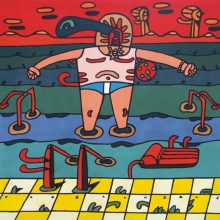art or business
László Varga: mukibongoék pesten
Mukibongo is a collective term that was invented during the course of a conversation among friends. It stands for the living creatures, objects and tiny things, which László Varga depicts in his works. This time around the Mukibongos have moved from Százhalombatta to Pest.
Through the years, László Varga's "compulsion" to fill surfaces has shifted from the initial technical problems in the direction of storytelling. The Indian ink, coloured pencils and felt-tip pens were replaced by paints and paintbrushes: from the lines unique forms emerged.
In his paintings from the second half of the 1990s, tiny things reminiscent of Miro's world (such as swings, cars, baby carriages) wander and float next to, under and over one another in flat, homogeneous, colourful space. Later these tiny things became larger and larger and, pushing their companions aside, began to take up the entire painting.
The basis of László Varga's neo pop art work is humour that is rooted in social and consumers' critique wrapped in childhood naiveté. Let's take for example the young man standing around in the children's swimming pool wearing swimming trunks and a dog chain or the "superman" with the plastic bag proudly rushing home with his newly acquired TV set under one arm. In one of the series, the themes of the paintings are determined by their possible "exhibition" location. This is how the works titled "Bathroom" and "Room" were created with vivid, lively colours and with a unique interpretation of the rules of perspective.
The young artist pursued his art education in Százhalombatta under the tutorage of Bandy László. He has participated in numerous solo and group exhibitions (Budapest Spring Festival, Akvarell Biennale, Százhalombatta, Eger) and has won numerous painting and graphics prizes. According to his teacher, "Laci Varga can perform a miracle: while he entertains, converses - and sometimes one gets the feeling, jokes around - with us, he also creates a mirror world in which, having set off with a sense of security, we get lost, having settled and made ourselves feel at home, we feel alien. And if we get lost in that strange world, we realise that it is in this one, in our world, that we must find our path and our place."

